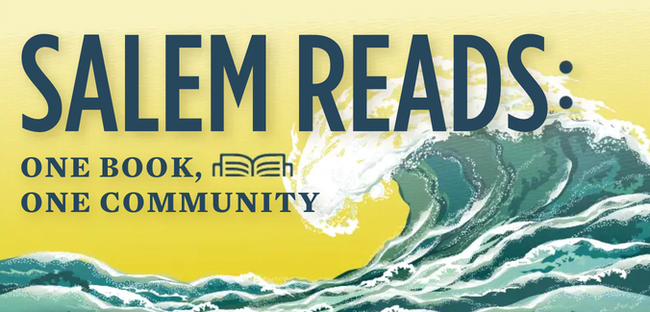
The Salem Reads flyer for 2022 (Salem Public Library Foundation)
The Salem area was once home to a thriving community of Japanese farmers who grew most of Oregon’s celery.
Though the community is less well-known today than large Japanese-American communities in Portland, Hood River and Ontario, about 300 families lived near Lake Labish, sending their children to Japanese school on weekends as they worked the land.
When President Franklin Roosevelt ordered Pacific Coast Japanese and Japanese-American people be sent to concentration camps at the start of World War II, most of the Salem-area farmers lost everything, said Chisao Hata, a spokesperson for the Portland-based Japanese Museum of Oregon.
But some were able to return, in part because they had neighbors in Salem who helped families or held onto their property for them during the years they were interned.
“I think that’s an important story to tell in these days, that there were people that stood up during that time,” Hata said.
Salem residents can learn more about the Lake Labish farmers – or dive into other aspects of Japanese culture, Buddhism and magical realism – through virtual programs planned for February as part of the Salem Public Library Foundation’s annual Salem Reads month.
Each year, a foundation committee selects a book for Salem residents to read together and buys copies to distribute for free.
City librarians then plan a month of contests, lectures, art shows and more related to the themes in the book.
The 2022 selection is “A Tale for the Time Being” by Ruth Ozeki, an American-Canadian author and Buddhist monk.
The novel tells the story of Ruth, a Japanese-American writer living on an island in British Columbia, who finds a diary from a 16-year-old Japanese girl, Nao, washed up on the shore following the 2011 Japanese tsunami. Ruth becomes engrossed in the teen’s life.
Sonja Somerville, Salem’s teen librarian, chairs the library’s programming committee and has worked to plan a month of events that touch on the book’s varied themes.
“We want to have some things that are fun and some things that are thoughtful and some things that are educational,” Somerville said.
She said the book’s themes, which include “seeking connection, exploring relationships and also dealing with very negative relationships,” as well as grief, resilience and “finding reasons to go on,” resonate particularly well as the world approaches year three of a global pandemic.
“All of those themes feel very relevant in our current world,” Somerville said.
Because the book employs elements of magical realism, the library is hosting both teen and adult workshops on the writing style, which is generally associated with literature from Latin America.
Portland Taiko, a musical group that performs traditional taiko drumming, will host a demonstration Saturday, Feb. 5. Other events cover Oregon’s earthquake alert system and the basics of genealogical research.
A “Dear Stranger” letter-writing event also runs through Feb. 27. Anyone can write a letter to a stranger and mail it to or drop it off at the downtown library. At the end of the month, each writer will receive a stranger’s letter.
Somerville said the idea was taken from an Oregon Humanities program. Participants have the option to sign their letters or remain anonymous. To help with writer’s block, the library has a suggested prompt – write about an important memory, or what you hope to be remembered for. Somerville said the goal is to “have this moment of connection with someone through writing.”
There’s also a writing contest inviting both teens and adults to submit a fictitious journal entry written by a grandparent or ancestor, with cash prizes of $50, $30 and $20 for the top three finishers.
Hata and Oregon artist Megan Stahl will give a presentation Feb. 8 on the history of Japanese-Americans in Oregon and Salem, with a focus on the impacts of internment. Like other Salem Reads events this year, the talk is held on Zoom.
It’s part of a larger effort by the newly-formed museum to better share the story of Oregon’s Japanese citizens as the 80th anniversary of the internment order approaches.
“We’re really the holders and keepers and sharers of that history,” Hata said.
She said Stahl is working to create an interactive tour of historical sites, including the farming community at Lake Labish.
Hata said she particularly wants to highlight instances where people stood up for Japanese-Americans, both during World War II and after, as the community sought to rebuild and eventually sought reparations for their imprisonment.
“I think during these times of social change and social justice and a lot of questioning about where we are in our culture and our world, it’s important to know the history but it’s also important to know how people dealt with the history. Oftentimes the whole story isn’t told,” Hata said.
For more information about Salem Reads, including a schedule of events and sign-up details, visit the Salem Public Library Foundation’s website.
Contact reporter Rachel Alexander: [email protected] or 503-575-1241.
JUST THE FACTS, FOR SALEM – We report on your community with care and depth, fairness and accuracy. Get local news that matters to you. Subscribe to Salem Reporter starting at $5 a month. Click I want to subscribe!









